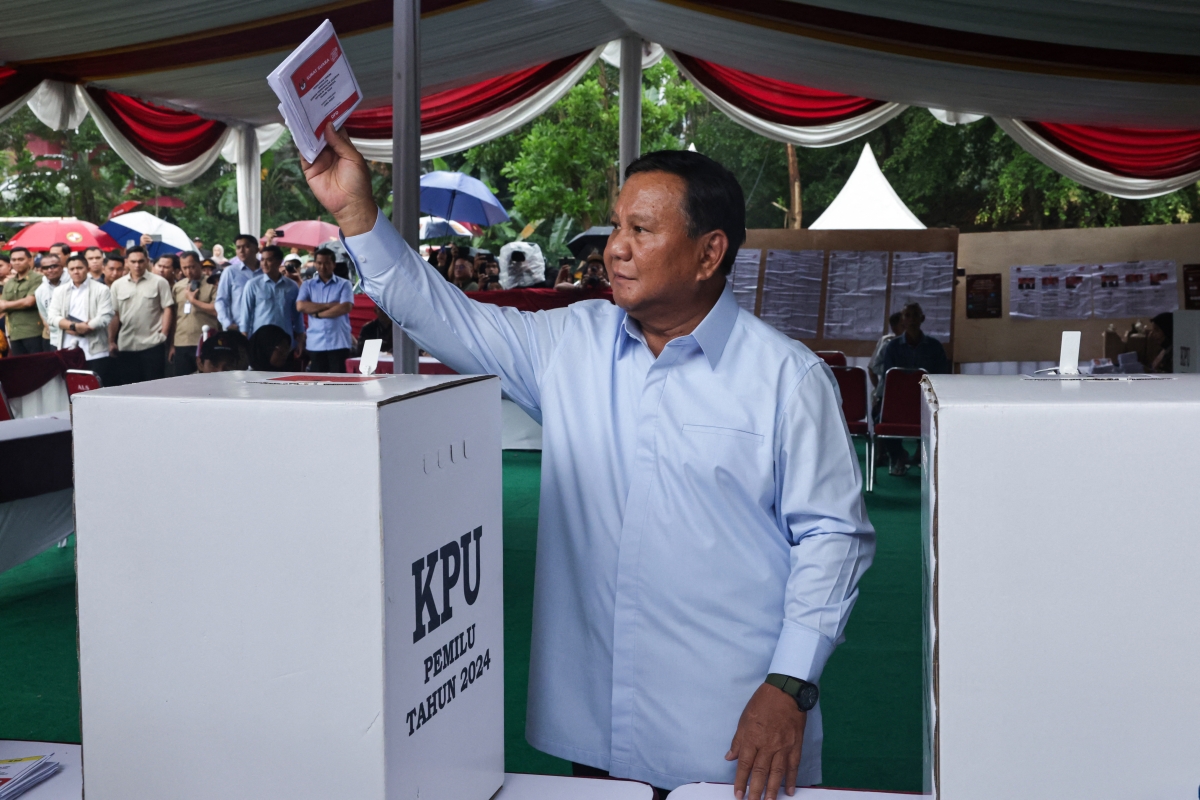From Jokowi to Prabowo: Will Reputation Matter for Indonesia?

In the world’s largest single-day democratic election, Indonesians came out in force to exercise their right to select their next president and their parliament. While voting is not compulsory in the fourth most populous state, around 80% to 85% of 204 million eligible voters turned out, more than half of whom were between the ages of 17 and 40. This “festival of democracy,” as it is affectionately known in the country, was an extraordinary feat of logistics that resulted in the 72-year-old current defense minister and three-time presidential candidate, Prabowo Subianto, winning in one round.
As background, Prabowo was a product of the New Order era (1967–1998), having served in the Indonesian military, commanding the notorious army special forces unit (Kopassus); he had also been the son-in-law of President Suharto. He has tried to become a presidential candidate since 2004, running for the vice presidency in 2009 and twice for the presidency in 2014 and 2019. In the last two elections, Prabowo ran with a stridently populist campaign and lost out both times to President Joko Widodo, popularly known as Jokowi.
Despite being political rivals, Jokowi invited Prabowo in late 2019 to join the cabinet, tasking him with improving the country’s military modernization and deepening security ties with key partners. Now that it is Prabowo’s turn to lead the county, he inherits the reins from a highly popular president.
Jokowi’s Mixed Legacy
For the past decade, President Jokowi has been at the helm of Indonesian politics. A self-made businessman of humble beginnings, he climbed from local politics to become the governor of Jakarta, Indonesia’s capital city, eventually reaching the summit of the presidential palace as the country’s seventh president. Nevertheless, Jokowi leaves the job with a mixed track record. He successfully presided over the expansion of much-needed infrastructure such as rail, roads, and ports; improved accessibility in a sprawling archipelago; and reduced transportation costs. He also improved access to health and education services for lower socioeconomic groups and tried to create jobs, particularly for younger Indonesians.
In trade and economics, Jokowi banned the export of raw materials so that value could be added domestically in a policy known as “commodity downstreaming.” At the same time, he sought to refine nickel at home to enter the electric vehicle battery market, securing Indonesia’s place in global supply chains.
However, Jokowi was also responsible for further democratic backsliding in the country, owing to policies that reduced the powers of the Corruption Eradication Commission, expanded military influence in non-security sectors, and enacted restrictions on freedom of speech and protest.
Perhaps most stunning was his decision to push for his eldest son, Gibran Rakabuming Raka, to be his former political foe’s running mate. While Gibran did not meet the minimum age requirement of 40, the decision was pushed to the Constitutional Court, which, led by Jokowi’s brother-in-law, found a legal loophole to allow the younger Widodo to run.
Great Expectations of Prabowo
Jokowi’s desire to see his agenda continued by Prabowo explains, for the most part, this unprecedented intervention of a current president and the election result of roughly 58% of the vote. As such, the Indonesian people will have high expectations that, after such clear signaling from the incumbent, Prabowo will continue the trajectory of infrastructure development, foreign investment, and economic growth.
Having had a cosmopolitan upbringing, the incoming president will have to harness his international experiences to secure investment from sources such as China to further finance key projects, among them the move of Indonesia’s capital.
It is good news for Indonesia, therefore, that world leaders have already sent their congratulations. Among early greeters, India’s Prime Minister Modi, Australia’s Prime Minister Albanese, and Russia’s President Putin wished Prabowo well, even though the official result had not yet been confirmed by the General Elections Commission. China’s ambassador visited the incoming leader, reflecting the importance Beijing places on Indonesia and its hopes for the continuation of policies favorable to China.
This support for Indonesia’s new leader reflects the country’s position as a global swing state because of its rising economic prospects, population size, and geostrategic location. World leaders will be hoping to strengthen ties with Southeast Asia’s largest state, which, with its youthful population, holds the potential as a manufacturing powerhouse.
Indonesia’s attraction is also the product of its important role in the Association of Southeast Asian Nations (ASEAN), its nonaligned strategic posture, as well as its “free and active” foreign policy principles dictating that Jakarta maintain close ties with all major powers. After an official meeting with Prabowo on 23 February, the Australian deputy prime minister underscored Indonesia’s importance as a strategic partner, declaring “Australia and Indonesia have a shared destiny and a shared collective security and that is the basis on which we are moving forward.”
The Road Ahead
While these features of Indonesia’s international engagement are not likely to change in the near future, we should expect Prabowo to leave his mark in a variety of ways. The country’s foreign policies for the next five years, for example, will be determined not just by the Foreign Ministry but also by the occasional intervention of a strong-willed incoming president who audaciously unveiled a Ukraine-Russia peace plan at last year’s Shangri-La Dialogue.
If Prabowo can channel his leadership into, for instance, harnessing intra-ASEAN cooperation on security and economic priorities, Indonesia and the region will benefit. Other opportunities include working together with the Quadrilateral Security Dialogue (Quad) to boost ASEAN centrality or using Indonesia’s influence to help shape the Global South’s agenda.
To the former general’s advantage right now is the silence about his background, in particular, allegations of human rights violations committed during his military tours of East Timor and during student protests in 1998. By and large, Western governments chose to set aside this record when he became defense minister in 2019. While realpolitik is nothing new, it does little to further domestic agendas for accountability and justice for victims and their families.
While both domestic and international observers will be alert to signs of further illiberalism in the country, the road ahead will be determined not just by Indonesia’s ongoing strategic importance and the expectations of its people but also by a man who, sitting in the wings for two decades, is finally in power.
